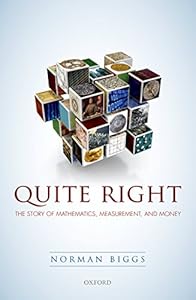#2,350 in Science & math books
Use arrows to jump to the previous/next product
Reddit mentions of Quite Right: The Story of Mathematics, Measurement, and Money
Sentiment score: 1
Reddit mentions: 1
We found 1 Reddit mentions of Quite Right: The Story of Mathematics, Measurement, and Money. Here are the top ones.
or
- 4 color 0.7mm ballpoint pen and 0.5mm mechanical Pencil
- Ballpoint Ink color : Black , Red , Blue and Green
- Acro Ink inclued
- Japan Import
Features:
Specs:
| Release date | February 2016 |

Thank you for the recommendations, I'll definitely add How to Prove it to my reading list, and Spivak will be read someday for sure. It's a mathematical classic as far as I can tell.
I'm not so sure that rigorous proof is strictly required to appreciate beautiful solutions to problems. I think of mathematics much the terms outlined in chapter 1 and 12 of Mac Lane (1985) Mathematics: Form and Function where it is explained how human cultural activities give rise to certain ideas, which are formalized into neat structures which can be then serve as a source of new ideas to improve the cultural activities.
This back and forth of activity, ideas and formalisms is the best way I know of to make cultural progress. It involves art, philosophy and mathematics. It's a damn pity that our society has divided these labors into seemingly unrelated activities when they are practiced at their finest in tandem.
So a book like Bigg's Quite Right: The Story of Mathematics, Measurement and Money may not be a proof based text but it gives one a huge appreciated for the beauty of modern notation, units of measurement, algorithmic simplicity and computational resources compared to those the ancients and medieval people had to work with, for example. This is an appreciation for the beauty of certain mathematical practices that is lost when teaching children numeracy devoid of an exploration the cultural contexts our current methods evolved from.
Actually, in cultural context, it seems absurd that we spend as much time as we do teaching young children paper and pencil arithmetic and so little time on spreadsheets and other computational methods, but I digress.